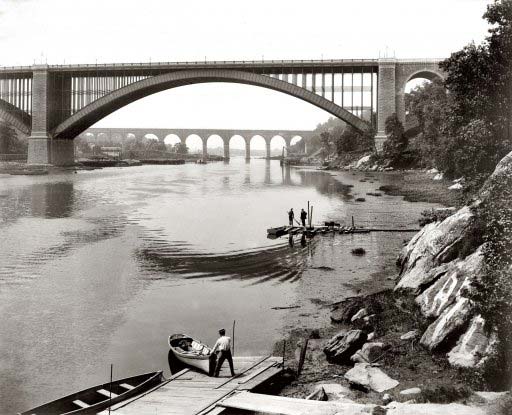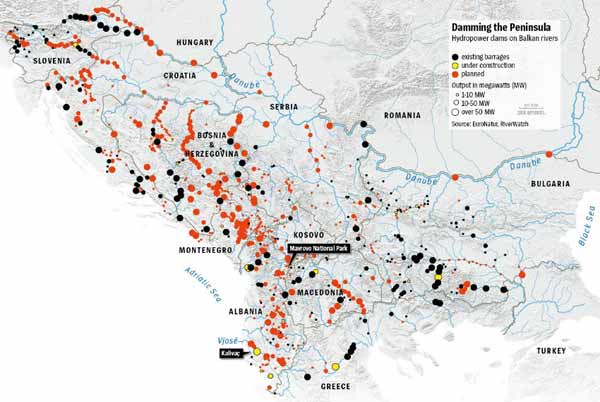
William Henry Jackson Washington Bridge and High Bridge over the Harlem River 1890
There are choices forced upon us by mankind’s “progress” and “development” that closely resemble such metaphorical conundrums as Scylla and Charybdis, Morton’s fork, Sophie’s choice, or in this case pretty much literally the devil and the deep blue river. We, people of the era of progress, tend to deny the existence of such choices and conundrums, because we like to think that if only we put our minds to it, we can solve any problem put before us. Even, or maybe especially, if we ourselves put it there.
Perhaps the most poignant among these choices “between two evils” is the result of the long succession of successes in the medical field over the past 150 years or so, that now allows us to save and prolong so many more human lives that – even leaving our voracious economic system aside -, not only do we put the earth under increasing pressure through resource exploitation, we also face the perils of sheer overpopulation.
Propagating lower birth numbers is very popular as an answer to the overpopulation issue, but in reality it offers no solution, at least not without creating additional problems, since human populations – like those of any other species – need a balance among age groups to remain healthy and viable: you can’t just raise the average age among a population even by 10 or 20% without at least potentially facing very serious consequences.
Then again, few of us would favor a Soylent Green approach, killing off the elderly to relieve the pressure. And while many people in the west choose to have fewer or no kids, and tell themselves it’s the right thing to do, that has the flipside of diminishing the global political and economic power of our own societies in favor of societies that not only simply keep on having as many – or more – babies as ever, but that also often have political and religious principles we absolutely don’t agree with. And whose dominance we would increasingly risk “handing” our children over to. Doesn’t sound ideal either.
When it comes to our pressure on natural systems, we mostly resort to things like purchasing hybrid cars and “better” sorts of lightbulbs, and then tell ourselves we’re doing our bit. Moreover, when BP started painting its gas stations green, and every government and corporation got a sustainability department, before you knew it the story became that we can be both richer and greener. Sustainability as a profit machine. What’s not to like?
And we believe that story, because we like to believe it. It provides us with the illusion that we can undo the damage we’ve done, and the damage we continue to do on a day to day basis, without having to make drastic adjustments to our lifestyles, and without having to give the whole thing too much critical thought. Because we may love to proclaim, when we see fit, that we believe in change, but we don’t want the kind of change that would rock our comfy boats so much we risk getting our feet wet.
Perhaps the best thing to do when faced with such choices is to let nature, providence or a deity of one’s choice decide, but since we tend to think we’re pretty smart, that’s not a popular option: we don’t like to acknowledge, much less accept, that there are problems we can’t solve. So we keep on falling for people coming up with newfangled ‘solutions’, preferably those that a make money while in the process of problem solving.
The following is just such a conundrum, on a smaller scale. Reporter Philip Bethge from Germany’s Der Spiegel magazine took a trip into what, with a bit of imagination (but don’t let them hear it), can be labeled Germany’s backyard: the Balkans, countries like Albania, Kosovo, Bosnia, Montenegro and Macedonia. Where Europe’s last remaining wild rivers are located.
What he found is that a group of usual suspects (Deutsche Bank, World Bank, European Bank for Reconstruction and Development (EBRD)) is busy financing hydro dams in the region. Very busy, actually: 570 separate dams are planned. They do so in a legal limbo land: EU rules would prohibit development of the kind and on the scale that is now being eyed, but the countries are not EU members. Yet.
This is an impossible choice between energy and the environment. Damming the rivers could provide the region’s nations with a lot of additional energy, which they demand larger amounts of as they grow, and they now have to purchase elsewhere. But it would destroy much of the ecosystems and unspoiled natural riches the rivers are an integral part of.
The obvious choice may seem to be: use less energy. But the Balkans as a whole are a region where the use of energy is still way below that of “mainstream” Europe, let alone America. It would be the same as telling China and India not to raise their people’s living standards because that would put the planet in danger. The Chinese, like the Albanians and Macedonians, will simply say: you – cut your use – first. Besides, the Balkan countries are all set to join the grand(iose) EU empire at some point in the near future, and that wouldn’t work out well if they were too much poorer than the rich core. The Greeks can tell you all about it.
Obviously, there are many aspects to the choices to make. But the essence seems to be: do we want to (hypothetically assuming we have a vote in this) let the Balkans import expensive and polluting energy from elsewhere, so their rivers may be saved, or would we rather let them dam the rivers and lose the natural systems connected to them, but save on emissions in those countries they would import power from? Don’t let’s forget that hydro provides non-intermittent baseload power, and can pretty much, unlike solar or wind, replace coal and gas watt for watt.
Perhaps the best shot we westerners have at solving this kind of problem is to start off by drastically cutting our own energy use, but we can’t both do that AND keep our present living standards, which depend on our energy use standards, which is what keeps our economies afloat – well, barely -. Besides, if some other region on the planet, for instance China, would opt not to do that, it would in all likelihood come to dominate us economically in no time flat.
I once labeled these kinds of choices this way: “Damned if you do, and doomed if you don’t“. Looks like that might be a versatile definition yet.

Hydropower Struggle: Dams Threaten Europe’s Last Wild Rivers
Europe’s last remaining wild rivers flow through the Balkans, providing stunning scenery and habitat to myriad plants and animals. But hundreds of dam projects threaten to do irreparable harm to the region’s unique biospheres – to provide much needed electricity to the people who live there. [..]
Most of the Continent’s waterways, like the Elbe, the Rhine and the Danube, have long since been hemmed in. But examples of Europe’s largely vanished wilderness remain. Such as the Vjosë, which flows unfettered through its valley in southwestern Albania, splitting off into tributaries that once again flow together in a constant game of give-and-take with solid ground.
“With every flood, the Vjosë shifts its course,” says Ulrich Eichelmann, a conservationist with the organization RiverWatch [..] “The river fills the entire valley, [..] such a thing in Europe can only be found here, in the Balkans.”
The Vjosë: 270 kilometers (168 miles) of river landscape, from the Pindus Mountains of Greece all the way down to the Adriatic Sea. Not a single dam disturbs the water’s course. No concrete bed directs its flow. And every pebble tells a story, says Eichelmann – of pristine mountain enclaves, of waterfalls, gorges and lakes.
The ‘Blue Heart of Europe’The Vjosë is not alone. Several crystal clear, untamed rivers rush through many countries in the region. “The blue heart of Europe beats in the Balkans,” says Eichelmann [..]
Experts say that approximately 80% of rivers in the Balkans remain in good or very good ecological condition — a paradise for fish, freshwater molluscs, snails and insects. But Europe’s last wild rivers are now at risk. More than 570 large dams, complete with hydroelectric power plants (each with a capacity of more than one megawatt), are planned for the region (see graphic).

With money from international financial institutions – among them Deutsche Bank, the World Bank and the European Bank for Reconstruction and Development (EBRD) – dam construction is well underway.
Eichelmann describes a “gold rush mentality,” with the “hydro-lobby” grasping for the last untapped energy market in Europe. Just before the Balkan states are forced to comply with ecological regulations as part of the process of joining the European Union, the industry is trying to establish a fait accompli: “Something that has long been banned in the EU, they’re now trying quickly to pull off in the Balkans,” says Eichelmann. It’s a sell-off of untouched nature in the name of green energy and climate protection.
Albanian Building BoomIn Albania, the taming of wild waterways is already in full swing. The poverty-stricken country is currently in the grips of a construction boom. Three large dams have already been completed on the Drin River in the north. [..]
The man behind the construction of this dam is an Italian named Francesco Becchetti. Back in Italy, the 47-year-old owns a construction and waste removal empire. He also owns an Albanian television station. [..]
At the office unit on the construction site, Becchetti shows his plans for the Vjosë dam. He’s brought along a thick stack of expert reports. His project has already swallowed up €70 million ($93 million) he says, including money from Deutsche Bank. Meanwhile the financial institution has backed out of the joint venture.
During the walk to the half-finished construction site, the conversation turns to the Vjosë. Is Becchetti aware that he is dealing with one of Europe’s last remaining wild rivers? No, answers the builder. “The dam won’t be a problem for the environment,” he says, “somebody had to explain this to me first, but we will add some steps for trout.”
A fishladder for trout? To mitigate the total loss of a unique habitat? From the perspective of ecologists, it sounds like a bad joke. “If the Vjosë degenerates into a chain of reservoirs,” fears Spase Shumka, from the department of natural sciences at the Agricultural University of Tirana, “the eel and mullet here, for example, would not be able to survive.” The fish, endangered throughout Europe, currently migrate up to 200 kilometers (124 miles) up the Vjosë.
Countless birds, such as little ringed plovers, little egrets and great egrets are dependent on the rivers’ floodplains, says Shumka. And many fish species found only in the Balkans, such as the Pindus stone loach, could be brought to the brink of extinction.
No Choice but Hydropower?In the Albanian capital of Tirana, however, it quickly becomes clear that nature conservancy is not high on the Albanian government’ priority list.
Minister of Energy and Industry Damian Gjiknuri lives in the government quarter along Dëshmorët e Kombit Boulevard. He made an honest effort during his first few months in office to raise understanding for nature conservation. But the country’s energy supply is an issue closer to his heart.
“Albania is still importing 35 to 40% of its electricity needs,” says Gjiknuri. In order to change that, Albania has no other choice but to pursue hydroelectric power. The potential is enormous: “We have the possibility to generate 10 times more electricity from hydropower.”
For the same reason, the state-owned energy company Elektrani na Makedonija (ELEM) wants to build two dams in neighboring Macedonia — in the middle of a national park.
The 73,000-hectare (180,000-acre) Mavrovo nature reserve lies on the border of Albania and Kosovo and is one of the oldest national parks in Europe. It contains old-growth beech forests, where wolves and bears still prowl. Its streams are home to otters, trout and freshwater crayfish. The pride of the region is the Balkan lynx; only about 50 specimens of the feline species continue to roam the woods – extinction is well in sight.
Two large dams are planned for Mavrovo National Park, one of those at Lukovo Pole. The place is perched high in the mountains, where the trees give way to dewy alpine meadows and biodiversity is at its apex. A nearby valley may become a candidate for UNESCO World Heritage status.
Further down, in the valley, is the Boskov Most, the last refuge of the Balkan lynx. That’s where a dam is planned which will block the Mala Reka River. The EBRD has already pledged €65 million for the construction project. A narrow road leads uphill along the Mala Reka. After driving for a few minutes, Eichelmann stops the car and jumps out. The first snow of winter lies across the valley like a porous blanket. The air is stingingly cold. The river froths and roars.
Eichelmann scrambles down the embankment. Suddenly he comes upon a world of light and shadow, cold and moisture. The water burbles over moss-covered rocks, disappearing into hidden hollows, forcing its way through ridges of icicles.
On an overhanging rock, a white-throated dipper has built a nest out of moss. There, among a labyrinth of roots and stones, live species of trout found only in the Balkans and the larvae of caddis flies and dragonflies. “That’s what I love: this unique variety,” says Eichelmann. What will happen to the Mala Reka when the dam is built? “The riverbed will be dry most of the time,” he says. The water of the future reservoir will still flow through the Mala Reka, but only in times of high electricity demand. Engineers call the technique “hydropeaking.” Once a day, a tidal wave will rip through the valley.
‘We Need Hydropower’International investors seem not to care. “None of the comprehensive studies and additional monitoring undertaken has suggested that the project could affect the national park status of Mavrovo,” the EBRD said in a statement. The power station operator for the power company ELEM likewise chose a reassuring tone, saying that the project would not endanger diversity.
Macedonia is one of the member states of the “Regions 202020 Network.” The countries involved have pledged to increase the share of renewable energies in their mix to at least 20% by 2020 and to reduce greenhouse gas emissions by 20% relative to 1990 levels in the same time period. “We need hydropower to take care of the future of our country,” says ELEM head Dejan Boskovski.
But international pressure is increasing. The International Union for Conservation of Nature (IUCN) passed a resolution demanding that the dam project in Mavrovo be abandoned. And last week, several hundred European researchers, including the German natural scientist Ernst Ulrich von Weizsäcker, a former German parliamentarian and nephew of the ex-German President Richard von Weizsäcker, appealed directly to the World Bank and the EBRD in an effort to halt financing for the Mavrovo dam. “We are surprised that your institutions have even considered supporting these dam projects,” reads the open letter. The projects “undermine the very idea of national parks” and “violate EU law, such as the Natura 2000 Directives and the Water Framework Directive.”
If nothing happens, “these rivers will be destroyed just as ours were in the 1970s, and it will be done with our help,” says preservationist Ulrich Eichelmann. “I am not opposed to hydropower, but we need a master plan for the Balkans to determine where it is okay to build such power plants and where it is not.”
A Glimmer of HopeMany of those countries in the Balkans that aren’t yet members of the EU would ultimately like to join. “One of the things these countries have to offer the union is scenery,” Eichelmann says. But most Balkan countries remain mired in economic crisis. And where there is a paucity of money, environmental protection often takes a back seat. Not even a rigorous look at river diversity has been undertaken thus far.
Still, the economic crisis could indirectly benefit the rivers. In many places, dam construction projects have become playthings for speculators — which is why Albania’s Energy Minister Gjiknuri has revoked some building permits. “Many investors haven’t started construction at all, but were trying to trade their licenses on the black market,” he says. “Some only pretended” to build “so that they could increase their price in the market.”
Gjiknuri doesn’t explicitly mention the half-finished Kalivaç dam. But he can’t hide the fact that he is unhappy with the situation there too. With good reason. Despite the energy with which Becchetti presents his Vjosë River project, almost no progress has been made in the last four years.
That gives Ulrich Eichelmann a glimmer of hope. “Thus far, no irreparable harm has been done to the Vjosë,” he says. “We will do everything we can to block the power plant — but it is a race against time.”



This article addresses just one of the many issues discussed in Nicole Foss’ new video presentation, Facing the Future, co-presented with Laurence Boomert and available from the Automatic Earth Store. Get your copy now, be much better prepared for 2014, and support The Automatic Earth in the process!















Home › Forums › The Devil And The Deep Blue River